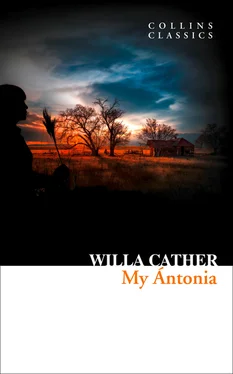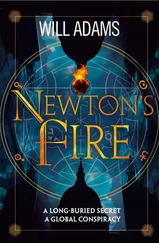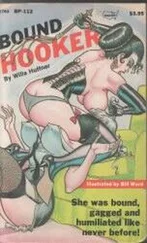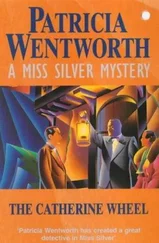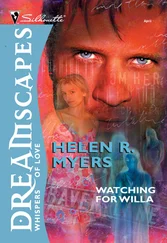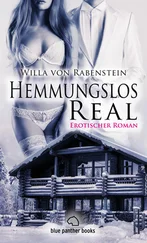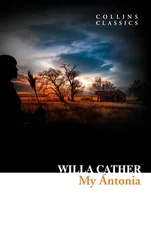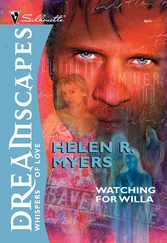1 ...7 8 9 11 12 13 ...16 “Look, Tony, that’s his poison,” I said.
I took a long piece of string from my pocket, and she lifted his head with the spade while I tied a noose around it. We pulled him out straight and measured him by my riding-quirt; he was about five and a half feet long. He had twelve rattles, but they were broken off before they began to taper, so I insisted that he must once have had twenty-four. I explained to Ántonia how this meant that he was twenty-four years old, that he must have been there when white men first came, left on from buffalo and Indian times. As I turned him over, I began to feel proud of him, to have a kind of respect for his age and size. He seemed like the ancient, eldest Evil. Certainly his kind have left horrible unconscious memories in all warm-blooded life. When we dragged him down into the draw, Dude sprang off to the end of his tether and shivered all over—wouldn’t let us come near him.
We decided that Ántonia should ride Dude home, and I would walk. As she rode along slowly, her bare legs swinging against the pony’s sides, she kept shouting back to me about how astonished everybody would be. I followed with the spade over my shoulder, dragging my snake. Her exultation was contagious. The great land had never looked to me so big and free. If the red grass were full of rattlers, I was equal to them all. Nevertheless, I stole furtive glances behind me now and then to see that no avenging mate, older and bigger than my quarry, was racing up from the rear.
The sun had set when we reached our garden and went down the draw toward the house. Otto Fuchs was the first one we met. He was sitting on the edge of the cattle-pond, having a quiet pipe before supper. Ántonia called him to come quick and look. He did not say anything for a minute, but scratched his head and turned the snake over with his boot.
“Where did you run onto that beauty, Jim?”
“Up at the dog-town,” I answered laconically.
“Kill him yourself? How come you to have a weepon?”
“We’d been up to Russian Peter’s, to borrow a spade for Ambrosch.”
Otto shook the ashes out of his pipe and squatted down to count the rattles. “It was just luck you had a tool,” he said cautiously. “Gosh! I wouldn’t want to do any business with that fellow myself, unless I had a fence-post along. Your grandmother’s snake-cane wouldn’t more than tickle him. He could stand right up and talk to you, he could. Did he fight hard?”
Ántonia broke in: “He fight something awful! He is all over Jimmy’s boots. I scream for him to run, but he just hit and hit that snake like he was crazy.”
Otto winked at me. After Ántonia rode on he said: “Got him in the head first crack, didn’t you? That was just as well.”
We hung him up to the windmill, and when I went down to the kitchen, I found Ántonia standing in the middle of the floor, telling the story with a great deal of colour.
Subsequent experiences with rattlesnakes taught me that my first encounter was fortunate in circumstance. My big rattler was old, and had led too easy a life; there was not much fight in him. He had probably lived there for years, with a fat prairie-dog for breakfast whenever he felt like it, a sheltered home, even an owl-feather bed, perhaps, and he had forgot that the world doesn’t owe rattlers a living. A snake of his size, in fighting trim, would be more than any boy could handle. So in reality it was a mock adventure; the game was fixed for me by chance, as it probably was for many a dragon-slayer. I had been adequately armed by Russian Peter; the snake was old and lazy; and I had Ántonia beside me, to appreciate and admire.
That snake hung on our corral fence for several days; some of the neighbours came to see it and agreed that it was the biggest rattler ever killed in those parts. This was enough for Ántonia. She liked me better from that time on, and she never took a supercilious air with me again. I had killed a big snake—I was now a big fellow.
While the autumn colour was growing pale on the grass and cornfields, things went badly with our friends the Russians. Peter told his troubles to Mr. Shimerda: he was unable to meet a note which fell due on the first of November; had to pay an exorbitant bonus on renewing it, and to give a mortgage on his pigs and horses and even his milk cow. His creditor was Wick Cutter, the merciless Black Hawk money-lender, a man of evil name throughout the county, of whom I shall have more to say later. Peter could give no very clear account of his transactions with Cutter. He only knew that he had first borrowed two hundred dollars, then another hundred, then fifty—that each time a bonus was added to the principal, and the debt grew faster than any crop he planted. Now everything was plastered with mortgages.
Soon after Peter renewed his note, Pavel strained himself lifting timbers for a new barn, and fell over among the shavings with such a gush of blood from the lungs that his fellow workmen thought he would die on the spot. They hauled him home and put him into his bed, and there he lay, very ill indeed. Misfortune seemed to settle like an evil bird on the roof of the log house, and to flap its wings there, warning human beings away. The Russians had such bad luck that people were afraid of them and liked to put them out of mind.
One afternoon Ántonia and her father came over to our house to get buttermilk, and lingered, as they usually did, until the sun was low. Just as they were leaving, Russian Peter drove up. Pavel was very bad, he said, and wanted to talk to Mr. Shimerda and his daughter; he had come to fetch them. When Ántonia and her father got into the wagon, I entreated grandmother to let me go with them: I would gladly go without my supper, I would sleep in the Shimerdas’ barn and run home in the morning. My plan must have seemed very foolish to her, but she was often large-minded about humouring the desires of other people. She asked Peter to wait a moment, and when she came back from the kitchen she brought a bag of sandwiches and doughnuts for us.
Mr. Shimerda and Peter were on the front seat; Ántonia and I sat in the straw behind and ate our lunch as we bumped along. After the sun sank, a cold wind sprang up and moaned over the prairie. If this turn in the weather had come sooner, I should not have got away. We burrowed down in the straw and curled up close together, watching the angry red die out of the west and the stars begin to shine in the clear, windy sky. Peter kept sighing and groaning. Tony whispered to me that he was afraid Pavel would never get well. We lay still and did not talk. Up there the stars grew magnificently bright. Though we had come from such different parts of the world, in both of us there was some dusky superstition that those shining groups have their influence upon what is and what is not to be. Perhaps Russian Peter, come from farther away than any of us, had brought from his land, too, some such belief.
The little house on the hillside was so much the colour of the night that we could not see it as we came up the draw. The ruddy windows guided us—the light from the kitchen stove, for there was no lamp burning.
We entered softly. The man in the wide bed seemed to be asleep. Tony and I sat down on the bench by the wall and leaned our arms on the table in front of us. The firelight flickered on the hewn logs that supported the thatch overhead. Pavel made a rasping sound when he breathed, and he kept moaning. We waited. The wind shook the doors and windows impatiently, then swept on again, singing through the big spaces. Each gust, as it bore down, rattled the panes, and swelled off like the others. They made me think of defeated armies, retreating; or of ghosts who were trying desperately to get in for shelter, and then went moaning on. Presently, in one of those sobbing intervals between the blasts, the coyotes tuned up with their whining howl; one, two, three, then all together—to tell us that winter was coming. This sound brought an answer from the bed—a long complaining cry—as if Pavel were having bad dreams or were waking to some old misery. Peter listened, but did not stir. He was sitting on the floor by the kitchen stove. The coyotes broke out again; yap, yap, yap—then the high whine. Pavel called for something and struggled up on his elbow.
Читать дальше
